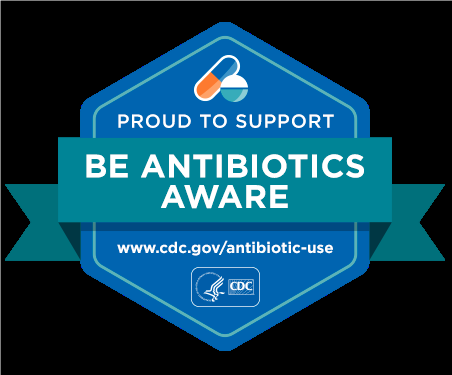Category: Antimicrobial Stewardship
Unpacking the new IDSA Community-Acquired Pneumonia guidelines
We are always excited to have our ID fellows provide guest blog posts. Second year ID fellow Dr. Lindsey Rearigh (follow her on Twitter @LRearigh) was recently on her Antimicrobial Stewardship rotation and reviewed the latest published guidelines for Community-Acquired Pneumonia (CAP). The American Thoracic Society (ATS) and Infectious Diseases Society of America (IDSA) recently […]
Dec 10, 2019
Antimicrobial Resistance is a Global Problem: Notes from the World Health Summit
From the World Health Summit, Berlin: Panel on Antimicrobial Resistance (AMR), October 27, 2019. The 2019 World Health Summit (#WHS2019) opened with a panel discussion about the accelerating problem of global antimicrobial resistance (AMR). Dr. Peter Beyer, an intellectual property law expert working with the WHO on global health applications, led a panel of international […]
Nov 26, 2019

Nebraska Medicine receives IDSA Antimicrobial Stewardship Center of Excellence Designation
In 2018, the Infectious Diseases Society of America (IDSA) began recognizing “Antimicrobial Stewardship Centers of Excellence” at hospitals that meet or exceed best practice standards. We are pleased to announce that Nebraska Medicine has recently been designated as an Antimicrobial Stewardship Center of Excellence effective October 2019. As we celebrate #AntibioticAwarenessWeek for 2019, we are reminded […]
Nov 22, 2019
Antimicrobial Stewardship efforts in the state of Nebraska
Content provided courtesy Dr. Salman Ashraf: Associate Medical Director, Nebraska Antimicrobial Stewardship Assessment and Promotion Program (ASAP) & Medical Director, Nebraska Infection Control Assessment and Promotion Program (ICAP) CDC’s most recent (2019) report on Antibiotic Resistance Threats in the United States describes 2.8 million infections due to antibiotic resistant organisms in the US resulting in over […]
Nov 21, 2019
#BeAntibioticsAware in the Community Hospital Setting
Bellevue Medical Center (BMC) is a community hospital campus of Nebraska Medicine. In 2017, our Nebraska Medicine Antimicrobial Stewardship Program expanded to include BMC with the expansion of our ASP expertise at our main campus. Danny Schroeder, a pharmacist at BMC, was recruited to lead the stewardship activities on that campus, with expertise provided by […]
Nov 20, 2019

Celebrating Antibiotic Awareness Week in Nebraska!
Antibiotic Awareness Week Proclamation Signing Ceremony CDC has designated November 18 to 24 as US Antibiotic Awareness Week. Antibiotic Awareness Week is an annual observance in the United States and around the world to promote the importance of using antibiotic appropriately as a mean to minimize unwanted effects from antibiotic therapy (e.g., adverse reactions, Clostridioides […]
Nov 18, 2019

Antibiotic Awareness Week Is Coming! How Will YOU Raise Awareness??
CDC has designated November 18-22, 2019 as US Antibiotic Awareness Week! We are joining the CDC and many organizations around the world recognizing and promoting awareness for appropriate antibiotic use. During #AntibioticAwarenessWeek, collaborative blog posts from UNMC ID/ASP and Nebraska ASAP will be published between November 18 and 22. Check out these videos supporting the Antibiotic […]
Nov 17, 2019

Are you ever involved with prescribing antibiotics in the hospital? We want to hear from you!
The Nebraska Medicine Antimicrobial Stewardship Program (ASP) invites you to participate in a research survey entitled: Use of Oral Antibiotic Therapy (OAT) for Definitive Treatment of Uncomplicated Bloodstream Infections (uBSIs): Opportunities for Antimicrobial Stewardship. There are several studies describing successful use of oral antibiotics to treat bloodstream infections, but are clinicians actually using oral antibiotics […]
Nov 14, 2019

Journal Club – Stewardship in Community Hospitals: How should we spend our limited resources?
Stewardship in Community Hospitals: How should we spend our limited resources? The following is a review by our ID Fellowship Program Director Dr. Trevor Van Schooneveld from our last Infection Control/Antimicrobial Stewardship Journal Club. He discussed the article by Anderson et al: Feasibility of Core Antimicrobial Stewardship Interventions in Community Hospitals. JAMA Network Open. 2019;2(8):e199369. Antimicrobial stewardship is […]
Sep 9, 2019
UNMC IDSHEAroes #RaceAgainstResistance Fundraising Milestone Unlocked!
The Society for Healthcare Epidemiology of America (SHEA) is sponsoring the Race Against Resistance for the 4th year. Money raised is used to fund educational scholarships involved in treating, and researching, ways to prevent the 2050 predictions from coming true. This is a chance to take a stand against ‘superbugs’, to support those fighting against them today, to […]
Sep 3, 2019

Recent Posts
- Conference on Retroviruses and Opportunistic Infections (CROI) 2026: Where to find our UNMC ID experts
- New Faculty Spotlight: Dr. Mohanad Al-Obaidi
- Pharmacists in Infectious Diseases: Expertise, Partnership, Impact
- Fast, Accurate, and Practical: Rapid AST for Gram-Negative Bacteremia
- 2025 Reflections From ID Chief – Dr. Warren
Archives
- February 2026
- January 2026
- December 2025
- November 2025
- October 2025
- August 2025
- July 2025
- May 2025
- April 2025
- March 2025
- February 2025
- January 2025
- December 2024
- November 2024
- October 2024
- September 2024
- August 2024
- July 2024
- June 2024
- May 2024
- April 2024
- March 2024
- February 2024
- January 2024
- December 2023
- November 2023
- October 2023
- September 2023
- August 2023
- July 2023
- June 2023
- May 2023
- April 2023
- March 2023
- February 2023
- January 2023
- December 2022
- November 2022
- October 2022
- September 2022
- August 2022
- July 2022
- June 2022
- May 2022
- April 2022
- March 2022
- February 2022
- January 2022
- December 2021
- November 2021
- October 2021
- September 2021
- August 2021
- July 2021
- June 2021
- May 2021
- April 2021
- March 2021
- January 2021
- December 2020
- October 2020
- September 2020
- August 2020
- July 2020
- June 2020
- May 2020
- April 2020
- March 2020
- February 2020
- January 2020
- December 2019
- November 2019
- October 2019
- September 2019
- August 2019
- July 2019
- June 2019
- May 2019
- April 2019
- March 2019
- February 2019
- January 2019
- December 2018
- November 2018
- October 2018
- September 2018
- August 2018
- July 2018
- June 2018
- May 2018
- April 2018
- March 2018
- February 2018
- January 2018
- December 2017
- November 2017
- October 2017
- September 2017
- August 2017
- July 2017
- June 2017
- May 2017
- April 2017
- March 2017
- February 2017
Categories
- Antibiotic Awareness Week
- Antimicrobial Stewardship
- Bench to Bedside
- Conferences and Presentations
- COVID-19
- Faculty and Staff
- Faculty Recruitment
- Fun With ID
- Guest blog posts
- HIV
- HIV/AIDS
- ICAP
- ID Grand Rounds Speakers
- ID History
- ID Pharmacy
- IDIG
- IDSA
- IDWeek
- In the News
- Infection Prevention and Control
- Journal Club
- Medical Education
- Micro
- Microbe Monday
- NBU
- Nebraska ASAP
- Nebraska ID Society
- Nebraska Medicine ASP
- Oncology ID
- Ortho ID
- Pediatric ID
- PharmToExamTable
- Publication Alert
- Research
- Transplant ID
- Uncategorized
- UNMC ASP
- UNMC Enhanced Medical Education Track
- UNMC ID Achievements
- UNMC ID Fellowship
- UNMC SCC
- UNMCID GIVES BACK
- Weekly Corona
- Why I Love ID
Recent Comments